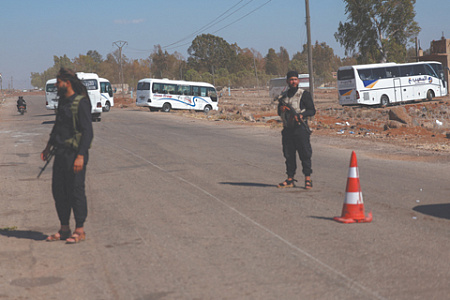
Israel and Syria have reopened security negotiations for the first time since violent clashes erupted in southern Syria, placing the region’s Druze community at the center of a fragile diplomatic effort. The talks, mediated by the United States administration, aim to forge a narrow security arrangement, yet are overshadowed by profound Israeli distrust of the new Syrian transitional government, which is composed of former Islamist leaders.
The renewed dialogue, facilitated by U.S. Ambassador to Ankara and Special Envoy for Syria Tom Barrack, was directly prompted by a recent surge in ethno-religious violence. The conflict flared up when forces of the Syrian transitional government, led by former militant commander Ahmed al-Sharaa, intervened in clashes between Druze and Bedouin communities in the Suweida province, reportedly siding against the Druze. The intervention triggered retaliatory Israeli airstrikes.
A fragile ceasefire was brokered on the night of July 20th, with terms stipulating that Syrian police forces could have partial access to the predominantly Druze Suweida region, but not the Syrian army. Zeev Elkin, a member of Israel’s security cabinet, explained that this distinction is critical, as Israel views Syria’s new national army as the primary source of instability, largely due to its composition of former Islamist fighters.
Fears in Jerusalem were amplified by videos circulating on social media allegedly showing Syrian army members humiliating Druze men by forcibly shaving their moustaches, a significant symbol of their cultural and religious identity. Israel’s primary demand in the talks is to secure concrete safety guarantees for the Syrian Druze, whom they see as directly threatened by the new regime in Damascus.
A high-ranking Israeli official, speaking to Axios, emphasized the precariousness of the situation, stating, “Relative calm has been established, but the fundamental issues will not be resolved without comprehensive agreements between the U.S., Israel, and the Syrian government.” Privately, officials close to Prime Minister Benjamin Netanyahu express deep skepticism about al-Sharaa’s intentions, viewing the current landscape in Syria as fraught with more questions than answers.
Complicating the delicate negotiations is the growing influence of Turkey, which has become the closest external ally and financial backer of the new government in Damascus. Feeling vulnerable after recent Israeli airstrikes reportedly hit targets as significant as the Syrian General Staff building and the presidential palace, Damascus has turned to Ankara for military assistance to bolster its defense capabilities.
According to the pro-government Turkish newspaper Hürriyet, Ankara and Damascus are moving towards a comprehensive military cooperation agreement. The pact is being framed as a response to what both nations perceive as a growing military threat from Israel, which they accuse of attempting to ignite a new civil conflict by exploiting Syria’s defensive weaknesses. It remains unclear, however, if this cooperation would extend to providing Syria with advanced air defense systems and how such a move would align with the ongoing talks with Israel.
This skepticism is shared by Israel’s own Druze community. Rada Mansour, a retired Israeli diplomat of Druze origin, voiced strong doubts about the possibility of reaching a genuine agreement with a government of former jihadists. He argued that the al-Sharaa government is likely using the negotiations merely to buy time, allowing it to regroup and strengthen its military. “Today they are weak,” Mansour stated. “It’s not out of the question that in 10-15 years, we will see them with an army of a million. This is very dangerous. I do not trust people who hold such a religious mindset.”
